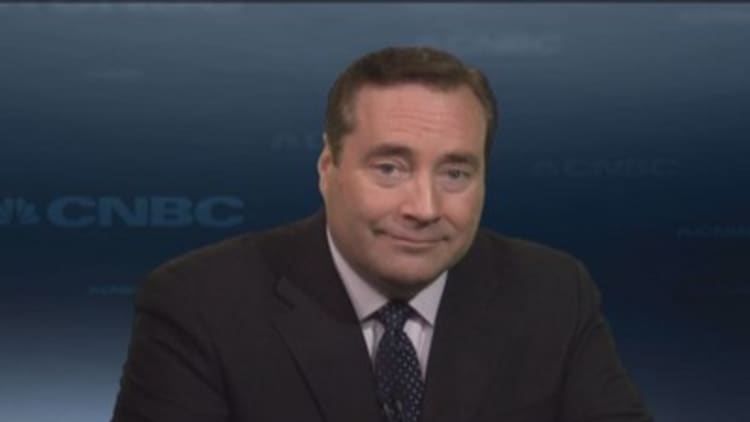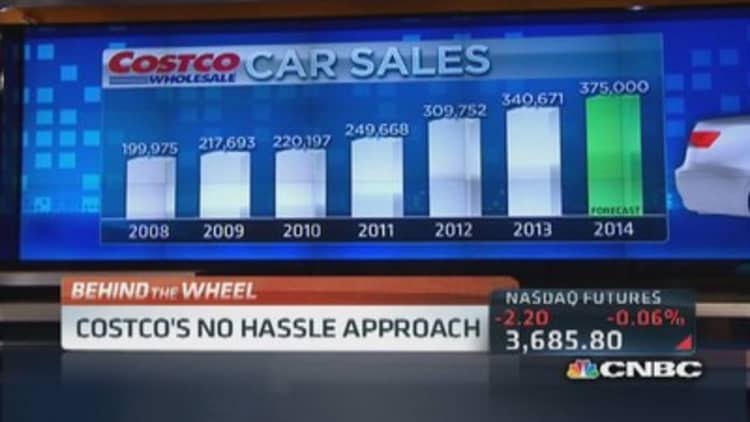For many Americans, new cars are driving out of reach.
Jose Hernandez, 24, lives in East Los Angeles and makes $26,000 a year working the front desk at a clinic. After a trade-in, he financed a 2013 Civic EX for $25,000 at 2.3 percent for 6 years, paying $379 in monthly payments, plus $100 per month in insurance. He finds a new car can be a stretch.
"I believe most cars are slightly out of reasonable price range for the average American, especially considering most 'affordable' cars don't last very long and lose a lot of value rather quickly," he said.
Read More'James Bond' cars go on display
For many Americans, a car isn't a way to get from point A to point B, it's freedom. The promise of an automobile goes beyond the thrill of the open road or being able to get a late-night pint of ice cream when you want. With a car, you've arrived. And with a car, you can always leave. Social mobility, a new life in a new town, used to be just a black ribbon of interstate away.
Now, amid stagnant wages and a shaky recovery, the average new car price rose last year by $1,536.
"Americans can only afford used cars," said Louis Hyman, an assistant professor in the labor relations, law, and history department at Cornell University. "The recovery has only been for those at the top and not for normal Americans."
Car ownership has long sat at the core of what it means to "make it" in this country. If you want to get to and around the suburbs, you'll need to drive.
It's an aspiration that's slipped from the grasp of most, as a new report finds the average new car unaffordable for the average American family in 24 of the 25 largest U.S. metro areas.
Read More
Except for Washington, D.C., median-income households in those areas fell shy of the $32,086 in annual salary required to buy an average new car, the Interest.com analysis found.

"The consumer gets to the end of the month and discovers they have no money left in their checking account," said Interest.com managing editor Mike Sante. "They've spent every cent they have and wonder how on earth they're supposed to save for their retirement or their kids' education."
But just because they can't afford it doesn't mean they aren't signing up to buy it, lured by a credit boom targeting ever riskier auto buyers.
This month, Standard & Poor's warned we could be entering the peak of a sketchy auto loan bubble that sounds suspiciously familiar.
The agency reported the number of loans packaged into securities with borrowers more than a month behind on their payments rose to its highest in three years. Several rounds of stimulus spending have driven investors to buy anything that beats inflation, experts say. That includes securities based on loans to subprime car buyers, and more loans being made to folks who can afford them less.
"We're at a turning point with respect to subprime auto loan performance, similar to where we were in 2006," said the ratings agency in its recent report, referencing the point right before the housing market collapsed.
While the auto loan market is measured in the billions, compared to the housing market's trillions, car buying is one of the main drivers of the economic cycle. Should credit for cars and trucks crash and dry up, it could hobble an already shaky recovery.
Some of those driving off the lot today with a bad loan in the backseat could find themselves living out of their new rides tomorrow.
Read MorePorsche to replace engines because of fire risk
That doesn't bode well for the next generation looking to get their kicks on Route 66, steal their first kisses parked in lakeside overlooks, or sneaking away to watch the sun rise.

Where will we be without collective national memories of roadtrips to catch our rockstar heroes, engines revving down shaded country lanes, and successfully hitting the late night drive-thru just before closing time? Not to mention just getting to work.
Recent studies show that since the start of the recession, teens are increasingly waiting longer to get their licenses.
And 80 percent of "Generation Y," those born 1977-1994, who have no plans to buy or lease a car say they can't afford it.
But we could just be getting revved up as the credit market loosens. However, this time around, sellers say, the boom is different.
Dealerships point out that car loans are much smaller than home loans, decreasing risk. And when forced to choose, buyers may skip the payment on their house. But they won't miss the one on their car.
"These are really good gambles for the banks," said Alan Helfman, owner of River Oaks Chrysler Jeep Dodge Ram in Houston, "They'll let the home go before the car. You got to get to work. You got to eat."

